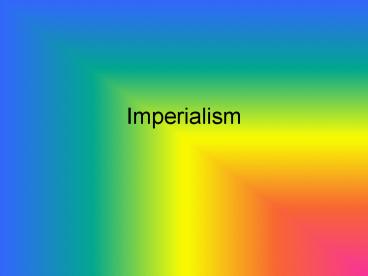Imperialism - PowerPoint PPT Presentation
1 / 10
Title:
Imperialism
Description:
3. Followers included Theodore Roosevelt and Henry Cabot Lodge. Spanish American War ... Theodore Roosevelt and Henry Cabot Lodge ... – PowerPoint PPT presentation
Number of Views:92
Avg rating:3.0/5.0
Title: Imperialism
1
Imperialism
2
- Imperialismdominate country indirectly rules a
weaker one. - Imposes its will by working behind the scenes
thru the natives. Gives a façade of
independence. - Reasons for
- 1. Economicsnatural resourcessugar in Hawaii.
- 2. Cheap labor
- 3. God/Christianity. Converts
- 4. Nationalism
- a. irrational love of ones country or
extreme patriotism. - b. coloniesprestige
3
- 5. Social Darwinismsurvival of the fittest
among humans. - Herbert Spencer
- 6. Civilizing Mission
- a. blends the above.
- b. blessed with civilization and religion,
so we must spread it. - U.S. Expansion
- 1. U.S. wanted colonies and the prestige--like
Europe. - 2. Rebirth of Manifest Destinyfrontier is
closed, look overseas. - 3. Bought Alaska in 1867 for 7.2.
- 4. Attempted to annex Hawaii and Samoa.
4
- Influence of Alfred Thayer Mahan and The
Influence of Sea Power Upon History, 1600-1783. - 1. Strong navy projects strength and power
- 2. Strong navy gives
- a. colonies
- b. foreign commerce
- c. naval bases across the world
- 3. Followers included Theodore Roosevelt and
Henry Cabot Lodge - Spanish American War
- Effort by the U.S. to get colonies.
- Steal some from Spain.
5
- Spain was weak and lost all colonies in Western
Hemisphere except Cuba and Puerto Rico by 1830. - Background
- 1. U.S. had mining and sugar interests in Cuba.
- 2. Cubans were revolting against Spanish.
- 3. Butcher Weylers atrocities.
- 4. Yellow Journalism
- a. fabricated/sensationalized events to
start a war - b. Joseph Pulitzer and William Randolph
Hearst
6
- President McKinley
- entered office supporting Cuban independence.
- Did not want a war.
- Perceived as weak.
- Theodore Roosevelt and Henry Cabot Lodge
- 4. De Lome letterthe Spanish foreign minister,
said there would be no war because he was weak.
7
- MaineFebruary 15, 1898
- 1. U.S. battleship exploded and sunk in Havana
harbor. - 2. Not enough evidence to assign blame, but
yellow journalists do. - McKinley now pressured to go to war.
- April 20, 1898, Congress endorses Cuban
independence and use of armed forces. - The War
- 1. George Dewey takes Manila on April 30.
- 2. Cuba
- a. major land action was July 1 at El Caney
and San Juan Hill. - Really Kettle Hill
- b. most troops died from disease
- c. Armistice signed on August 12, 1898
- 3. AcquisitionsCuba, Guam, Puerto Rico,
Philippines
8
- Reorganizing Cuba
- 1. Teller Amendmentattached to the war
declaration and said Cuba will govern itself. - 2. General Leonard Wood
- a. reorganize schools
- b. reorganize finances
- c. drafted a new constitution
- 3. Walter Reed got rid of yellow fever
- 4. Platt AmendmentAmerica did not want foreign
activity in Cuba, and wanted the right to naval
bases thereGuantomano Bay - 5. U.S. left in 1903
9
- Philippines
- 1. stiff resistance from the natives
- 2. guerilla warfare massacre and torture on
both sides - Anti-imperialists
- 1. imperialism is inconsistent with American
ideals - 2. liberate Cuba but annex the Philippines
- 3. Philippines would become an Achilles heel.
10
- Imperialism in East Asia
- 1. China beaten by Japan in 1894-1895, which
demonstrated its weakness. Spheres of influence
created - 2. Open Door PolicyJohn Hay
- a. Leave China open to trade with all
countries - b. Cant interfere with other countries
spheres of influence - 3. Boxer Rebellion (China)
- a. Boxers rebelled against foreigners,
killing missionaries and families. - b. defeated by a multinational force.
- c. China forced to pay reparations--11
million to U.S.

